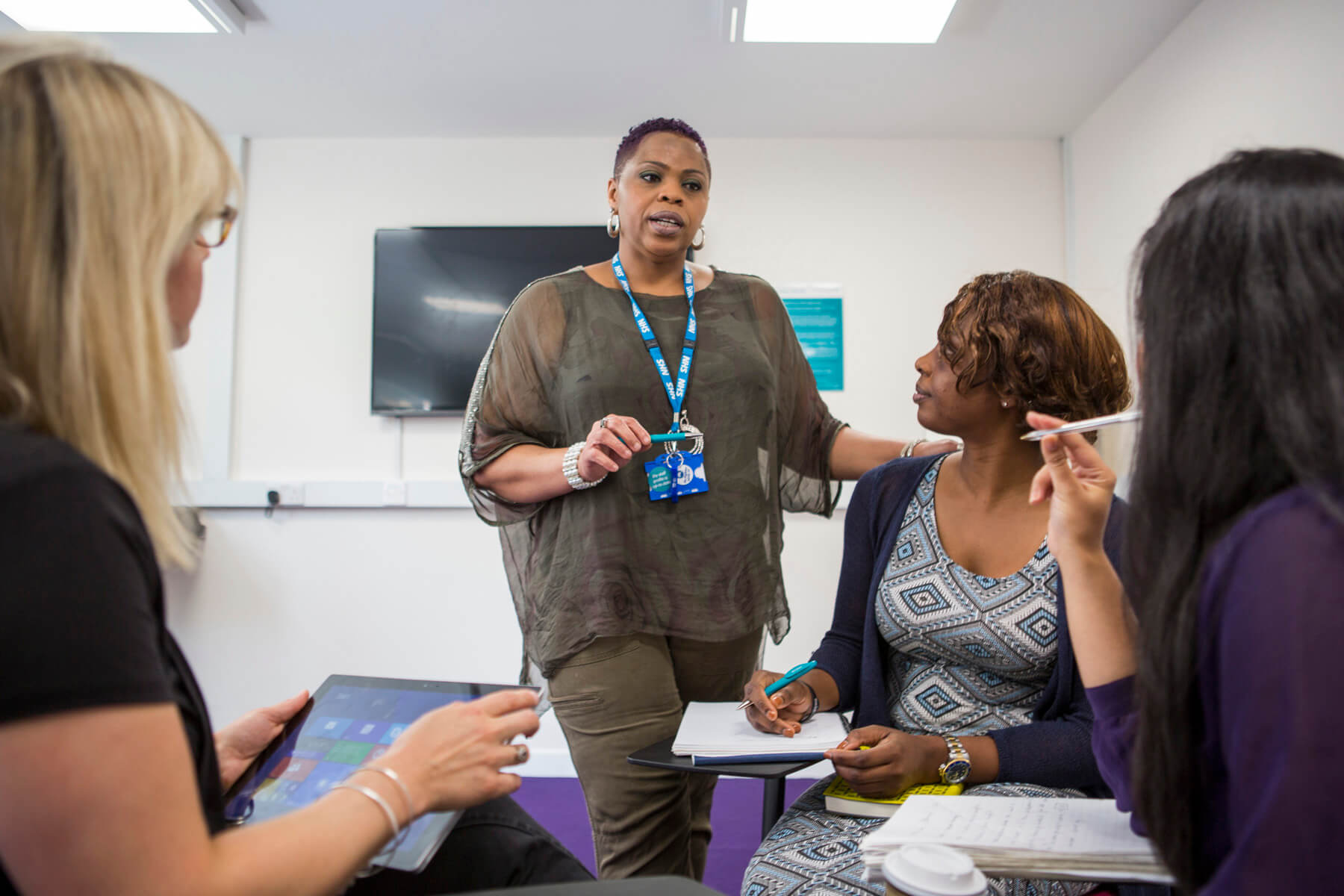
Introduction to counselling and psychotherapy (D12/ED12)
Take your first steps into psychodynamic counselling and psychoanalytic psychotherapy
This popular course provides an introduction to a psychoanalytic understanding of the human mind and to specific principles of psychodynamic psychotherapy at an elementary level.
We will analyse human development through a psychoanalytic lens, while exploring key psychoanalytic concepts, complex mental health presentations and how we view the life of groups and organisations, as well as difference and diversity.
This course is available to study as in-person the Tavistock Centre in London, or as a fully online version.
Applications for this course are now closed for September 2025 entry. Please register your interest to be notified when applications open for 2026 entry.
About this course
This is the entry level course to our adult psychotherapy cluster of professional training programmes and is suitable if you are taking your first steps towards a qualification in counselling or psychotherapy.
It is also a popular CPD opportunity for people working in health care, education, social care or the voluntary sector who want to deepen their understanding of mental health issues and develop self-reflection in their professional and personal lives.
For others who work in unrelated fields, it is an opportunity to begin a course of study that may open up new career opportunities, as well as new ways of thinking about the world we live in
Over the year, the course involves:
- weekly theory lectures and reading seminars
- weekly workplace discussion seminars
- weekly set readings
- a weekly self-reflective journal
- termly individual tutorials
- a workplace observation project (to be arranged by you)
- opportunities to develop psychoanalytic observational skills and self reflection, which are integral to therapeutic work
- access to supplementary video lectures – online version (ED12) only
Module 1: Workplace Observation
- Year one
- Core module
- Module lead: Francesca Benjamin
Module aims
The aims of the module are to:
- facilitate the writing of detailed accounts of interactions encountered in the placement, in the first person, to include your own actions, feelings and comments as well as those of the adult or children observed
- deepen critical awareness of the impact that difference in identity and experience can make – this includes consideration of social class, race, sexual orientation, gender, religion, disability and age
- carry over the observational stance into the study of interactions and behaviour in placement work
- reflect on your reactions and behaviour within the placement and to deepen your self-reflective capacities
- develop an understanding of unconscious communication and processes which are inherent in relationships, through engagement with placement observation
- develop the capacity to notice your own limitations, and to reflect on these
- develop understanding of a range of roles and settings in community settings, through group learning and discussion
- study the emotional experience in interactions between workers or volunteers and clients, where feelings evoked might impact on behaviour or the professional task
- be able to formulate a coherent hypothesis linked with relevant evidence
- develop the capacity for self-directed learning
Module assessment
This module is not formally assessed. However, you will need to set up a placement where you can develop psychoanalytic observational skills (see placement information below). You must submit 12 of your observation write ups over the year to successfully complete the course.
Module 2: Psychodynamic Theory
- Year one
- Core module
- Module lead: Francesca Benjamin
Module aims
The aims of the module are to:
- provide an introduction to psychodynamic theory and its development over time, through lectures and discussion
- critically explore psychoanalytic concepts which support work in mental health, covering a range of topics linked with emotional development and mental health
- develop a foundation level understanding of personality development, and the impact of individual social, cultural, economic and racial differences on identity
- learn about the psychodynamic setting and the therapeutic relationship
- learn about a range of mental health diagnoses and their presentation
- critically examine the role of equality, diversity, power and oppression in therapeutic practice and in psychodynamic theory
- gain understanding of basic psychoanalytic techniques in a live working group and to explore group processes and our roles in them
- facilitate critical reading of key psychoanalytic texts in large group discussions.
- consider the theoretical material presented in the light of differing cultural perspectives.
- facilitate curiosity, self-reflection, and self-directed learning about reactions to the material presented
- provide basic psychodynamic concepts with which to understand observational placement work
- help you reflect on how theory can develop skills and understanding needed for future clinical trainings
Module assessment
This module is not formally assessed.
Workplace observation
The requirement to undertake a workplace observation project is a significant component of the course. Ideally, this should be in place before the course begins. The project may be within your own current workplace – if you work in a healthcare, education or other related profession. If that is not possible, you must organise a voluntary placement in a suitable setting.
It is strongly advised that placements are organised and secured prior to, or immediately following the start of the course to fully maximise your learning experience and opportunity whilst enrolled.
Examples of suitable placements include: a mental healthcare setting (local mental health or hospital setting), a charitable organisation, or an educational setting (a school or youth centre).
The placement can be a purely observational experience, such as observing a support group in a mental health clinic or psychiatric unit. You could also opt for a more hands-on experience of becoming a befriender for clients who come to your chosen centre or service, or taking a group of children or young people for an activity in an educational or youth programme setting. A number of our students take up roles with elderly or homeless service users and find these roles very rewarding.
We ask that you put aside at least two hours per week for your placement. Alongside this, each week you must write a work observation report (1,500 words) – you will take turns to present this in weekly work discussion seminars.
Who is this course for?
The course is suitable for both individuals and healthcare professionals wishing to explore their interest in psychoanalytic psychotherapy, including those thinking of taking their first steps toward a formal qualification.
There are three common reasons why our students study this course:
- to investigate further whether or not they would like to undertake a clinical training in psychoanalytic or psychodynamic psychotherapy
- for interest, and to find out more about psychoanalysis in order to apply the approaches and theories to their personal and work lives
- to support them whilst they gain the necessary experience to be eligible for a clinical training in psychodynamic or psychoanalytic psychotherapy
We celebrate the rich diversity of our student group and encourage people to apply whatever their background.
Course details
To undertake this course, you need to:
- have a demonstrable interest in psychodynamic counselling, psychoanalytic psychotherapy or psychoanalysis and a wish to make a deeper study of the human mind, either for professional reasons or for the purposes of your own personal development
- be able to organise a workplace observation project which must be in place before the course begins. While it is not mandatory for a placement to be organised by the time of interview, it is encouraged to start thinking about this as early as possible
Although the course aims to be supportive and containing in its approach, the subject matter can be emotionally challenging. Personal readiness for the course is therefore an important factor which will be explored at interview.
Application guidance
When completing the application form, you will be asked to write a personal statement of up to 8,000 characters. The personal statement is a very important part of the application process, which gives us a sense of who each applicant is as a person. For this reason, the style of writing can include personal experiences and reflections, where relevant.
In your personal statement, we would hope to get a sense of the following areas:
- your reasons for applying
- a general idea of what your understanding of psychotherapy is, and what this course entails
- your personal background, and how this relates to your interest in this course
- any past experiences of therapy and their impact on you, or demonstration of an interest in engaging in psychotherapy in the future
- reflection on the idea of taking up a placement, and some personal thinking or exploration around what this might be like on an emotional level.
Tuition fees
In-person, London version (D12)
Home
£4,400 (2025/26)
International
£8,800 (2025/26)
Online version (ED12)
£4,400 (2025/26)
There are no international fees for the online version.
For more information on tuition fees, including paying for tuition fees, please refer to our tuition fee guidance.
Funding
Bursaries
We’re committed to becoming an inclusive education provider. We offer several bursaries for new students from Black, Asian or Minority Ethnic / Global Majority backgrounds, funded by The Tavistock and Portman Charity.
Please note: bursaries are only available for the in-person, London version of the course.
Funding for current students
We offer several funding options to support current students who need financial assistance during their studies. Please refer to our financial support guidance for more information.
Assessment
Assessment for this course is based upon a minimum attendance rate of 75% throughout the year, plus the submission of 12 write ups (each 1,500 words) taken from observations from the work placement.
Successful completion of these assessment components will enable you to receive your Professional Certificate.
Attendance
This course is studied on a part-time basis and attendance times will vary depending on the version you choose.
In-person, London version (D12)
You will be required to attend teaching at the Tavistock Centre in London on Tuesday mornings from 9.30am to 12.30pm. The timetable consists of a weekly small observation discussion group, followed by large group theory lecture, including space for theoretical discussion.
You will also need to spend two hours each week on your work placement.
Online version (ED12)
Attendance is fully online. Closer to the start of the course, session times will be announced to take into account the time differences of students from all over the world.
With all teaching delivered remotely, the course offers a flexible setting in which to learn about counselling and psychotherapy – combining live weekly online seminars, led by our experienced clinician-tutors, with a number of online resources, including weekly video lectures and a range of relevant literature, accessible via our online library.
You will also need to spend two hours each week on your work placement.
Students from this course tend to go on to do further training to become either adult psychotherapists or child and adolescent psychotherapists.
Some students choose to continue their studies through organisational consultant or coaching courses.
Why study with us?
This course will introduce you to some of the key concepts in psychodynamic counselling and psychoanalytic psychotherapy. It will teach you about different kinds of mental illness from a psychodynamic perspective and will offer you a comprehensive theoretical framework within which to understand mental health and therapeutic work in the human services.
A key aspect of this course is the emphasis we place in our teaching and learning processes on difference and diversity. We will look at how difference and diversity (including, but not exclusive to race, ethnicity, sexuality, gender and disability) is thought about in terms of psychoanalytic thinking and through learning from experience.
Testimonials
Course facilitators
Register your interest
Applications for this course are now closed for September 2025 entry. Please register your interest to be notified when applications open for 2026 entry.
Recommended courses
Explore courses to study next
-
 Professional certificate
Professional certificate 
Psychodynamic reflective practice in mental health (D65)
-
 Master’s Eligible for Student Visa
Master’s Eligible for Student Visa
Psychodynamic psychotherapy (M58)